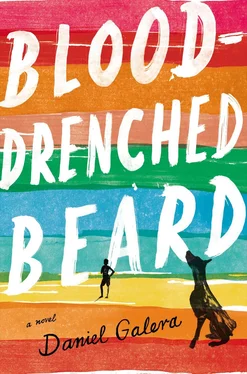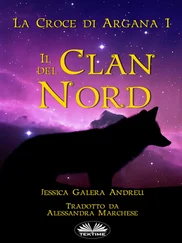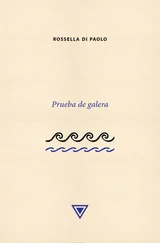Antenor reduces the speed and slowly approaches the area of underwater rocks as he and Matias discuss the best place to anchor. Matias points at a place almost inside the reef. The two of them ready their spear guns, pull on flippers, secure knives in their shin supports, and put on snorkels. Matias is the first in and swims a short distance toward the reef, towing the signaling buoy behind him, before going under for the first time. It is one minute and fifteen seconds before he surfaces. Then Antenor jumps out of the boat and swims to the left, looking for a different place to fish, then dives down with the help of twenty-pound diving weights attached to his wetsuit. He watches the two men for a few minutes, feeling the rocking of the boat, then puts on his goggles and swimming flippers, much shorter than the ones used for diving, takes off his shirt, gets his spear gun, and slips into the cold sea.
When he is close to the rocks, he holds his breath, dives under and hears the tremulous symphony of the shellfish, a sound he has heard before when swimming near rocks on some beaches but never with this intensity. The clattering of the shellfish is frightening, as if billions of pinchers or teeth are chattering and reverberating in hollow caverns. His swimming goggles allow him to see only the closest rocks. The clamor ceases entirely when he raises his head out of the water, and not even the murmuring of the ocean and wind disrupt the sudden impression of silence. Two distinct worlds.
In the murky seascape of rocks and corals, he sees shellfish and some fish he can’t identify. No sign of shoals of fish, much less groupers, which is what they were hoping to find. Matias had told him to look in holes and crevices, where they like to rest. Most groupers nowadays weigh about five pounds, sometimes ten, with a lot of luck fifteen. More than twenty is a trophy. Nothing compared to what his granddad must have caught several decades earlier, when they often weighed sixty or seventy pounds. He dives down a dozen times but doesn’t see any holes or caves or groupers. He doesn’t see anything that deserves to be the target of a spear gun.
He returns to the boat, and when he comes up, he sees a storm approaching from the south, covering the hills of Ibiraquera and Rosa Beach. Matias and Antenor are still underwater, among the rocks. Their yellow buoys vanish and reappear in the rise and fall of the waves. They don’t seem concerned about the leaden clouds that are drawing near, or about the wind that is whistling louder and louder. They’re the experts. He leaves the spear gun in the bottom of the boat and dives down again. He tries to measure the depth at that point. He descends until his ears hurt from the pressure, and he can see large yellow rocks at the bottom. They must be some fifteen to twenty feet below the surface. He swims back to the reef. At some points the rocks almost reach the surface, and he is able to stand on them.
According to his dad, his granddad was able to hold his breath for three or four minutes or even more. Another diver had died of a pulmonary embolism trying to match his time. He dives under, swims around the rocks a little, checking the time on his watch, and emerges only when he starts to feel the terrifying throbbing behind his eyes that is brought on by a lack of oxygen. One minute and five seconds. On his next attempt he sees a purple octopus dragging itself along the bottom, stirring up a small cloud of sand before hiding under a rock. The duration of this dive is only forty-eight seconds. He decides to rest for a moment. The wind churns the waves. On his third attempt, he stays down for one minute and six seconds and decides to call it a day. He doesn’t have his granddad’s lungs.
He returns to the boat, puts on the waterproof jacket in a useless attempt to warm up a little, and tries to measure how long his companions are able to hold their breath. One of Matias’s dives lasts one minute and forty seconds. He hasn’t been there long when Antenor swims back to the boat and climbs in with difficulty. When he goes to help him, he sees that his snorkeling mask is full of blood. Antenor takes off the mask and blood streams down his face and neck.
I’ve burst something, he says, holding his nose. Fuck, it hurts like shit. I think I’ve got sinusitis.
The bleeding stops, and Antenor starts feeling nauseous.
Fuck, fuck, he stammers. I don’t feel well.
He opens his packet of strawberry-cream-filled cookies and offers some to Antenor. Large waves toss the boat about violently. The temperature has plummeted at least ten degrees, and the entire horizon has disappeared in the approaching storm. The wind roars and flings fans of spray into the air. The birds are all long gone. Antenor glances uneasily toward the reef.
Matias found a big grouper in a hole and won’t come back until he’s got it. I know him.
But soon, to their relief, Matias is swimming toward the boat. After climbing in, he tugs on a rope and pulls two copper-colored groupers out of the water, a large one weighing some eighteen pounds, and a small one of about five and a half. He poses holding the larger of the two by its enormous, scary-looking jaws with both hands, and Antenor takes a photograph. The camera’s flash lights up the bright red interior of its mouth and rings of sharp little teeth. It starts to rain. Matias pulls a tube of condensed milk out of his bag and starts eating the sugary goo. Antenor starts the motor and the boat tears off toward the bay, fleeing the storm.
• • •
A sprint triathlon makes for a lively morning on the third Saturday in June. The sun is shining, but a bad-tempered northeasterly makes things tough for the athletes. The main avenue has been cordoned off for the cyclists and runners, and in the choppy sea two red buoys mark the triangular swimming circuit. The bicycles are lined up in the transition zone, which has been set up on a cross street a block from the seaside boulevard. Coaches, families, friends, and residents form a crowd behind the yellow tape on the sidewalks of the main avenue to cheer the competitors on. Two of his running students, Sara and Denise, have registered in relay teams for the five-kilometer run. Sara’s shins no longer hurt, and her friend Denise has visibly lost weight and is running a nine-minute mile, which is considerable progress since her first few runs on the beach. He is going to do the 750-meter swim for Sara’s team. On the bicycle is Douglas, Sara’s husband, a cordial man of few words, some ten years older than his wife, hairy and half bald. Douglas has a strong accent from the north zone of Porto Alegre and stays fit by surfing regularly all year round and riding his sprint bike to Highway BR-101 on Sunday mornings.
He knows some of the professional competitors, and his most effusive reunion is with Pedro, sponsored by Paquetá Esportes, who can often be seen collecting prizes on podiums and is ranked eleventh in the country. The night before, at the technical meeting in the Hotel Garopaba dining room, the first thing Pedro asked him was if he was sick. He thought his old training partner looked a little too thin and haggard, not to mention the unruly beard. He assured him he was in good health, and as for the beard, well, he’d got sick of his own face and was conducting an experiment. Pedro got the joke and laughed. They gave each other a tight hug. Pedro had walked over and said, Hi, it’s Pedro. The two of them had great respect for each other. They had spent hundreds of hours together running, riding, and swimming long distances, encouraging and distracting each other, one setting a faster pace for the other, trying to keep up with the other one’s pace, sharing the semimeditative mental state of prolonged exercise. Pedro is the same age as him, thirty-four, but he knows they both look a little older than that. Too much effort, too much sun, too many free radicals in the blood, along with all the physical and emotional problems that everyone else has and which you carry in the body as glaring or subtle marks, sometimes extremely subtle or even invisible, and even then in some way perceptible from the outside. The body is its own time capsule, and its journey is always somewhat public, no matter how hard you try to cover it or hide it behind makeup.
Читать дальше












